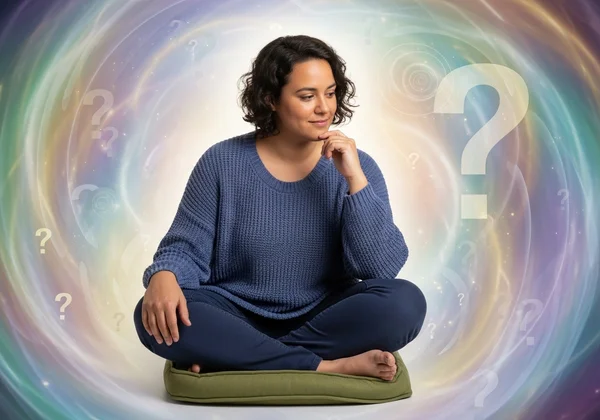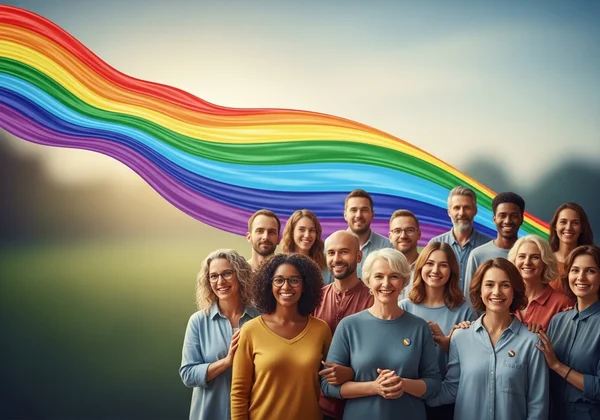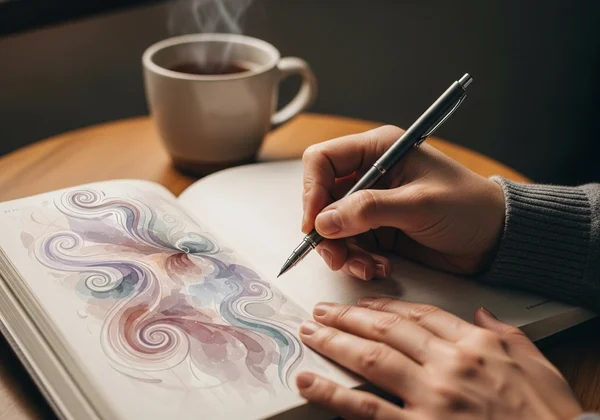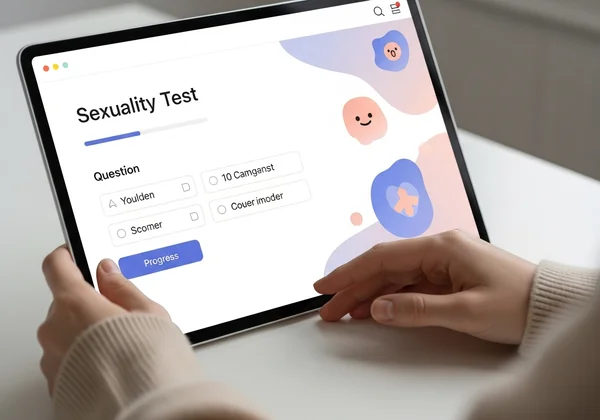Đang băn khoăn về xu hướng tính dục của bạn? Hãy làm bài kiểm tra xu hướng tính dục bí mật của chúng tôi để tìm thấy sự rõ ràng
September 15, 2025 | By Maya Ramirez
Cảm thấy không chắc chắn về xu hướng tính dục của mình có thể là một trải nghiệm gây bối rối nhưng vô cùng phổ biến. Nếu bạn đang băn khoăn về xu hướng tính dục của mình, hãy biết rằng bạn không hề đơn độc. Hành trình tự khám phá này là độc nhất đối với bạn, và hoàn toàn bình thường khi bạn chưa có tất cả các câu trả lời ngay lúc này. Hướng dẫn này ở đây để giúp bạn điều hướng "giai đoạn băn khoăn" với sự đồng cảm và các chiến lược thực tế. Chúng tôi sẽ khám phá cách xác nhận cảm xúc của bạn và trao quyền cho bạn trên con đường của mình. Làm sao để hiểu rõ xu hướng tính dục của mình? Nó bắt đầu bằng việc cho phép bản thân có không gian để khám phá cảm xúc của bạn một cách an toàn và không phán xét.
Ý nghĩa của việc băn khoăn về xu hướng tính dục là gì?
“Băn khoăn” đơn giản có nghĩa là bạn đang khám phá bản dạng tính dục của mình. Đó là một quá trình nhìn vào bên trong, nơi bạn có thể không chắc chắn về người mà bạn bị thu hút – dù là về mặt lãng mạn, tình dục, hay cả hai. Đây không phải là dấu hiệu của sự bối rối theo nghĩa tiêu cực, mà là dấu hiệu của sự tự nhận thức sâu sắc. Đó là một bước đi dũng cảm để hiểu bản thân ở một cấp độ sâu sắc hơn, thách thức những giả định mà bạn hoặc xã hội có thể đã giữ.
Nhiều người, từ thanh thiếu niên như Zoe đến người lớn như Alex, thấy mình ở trong không gian này vào những thời điểm khác nhau trong cuộc đời. Việc băn khoăn có thể được kích hoạt bởi một mối quan hệ mới, một tác phẩm truyền thông gây tiếng vang sâu sắc, hoặc đơn giản là một cảm giác ngày càng tăng rằng một danh xưng đã được giữ trước đây không còn phù hợp nữa. Đó là một phần tự nhiên của sự phát triển con người và sự trưởng thành cá nhân. Giai đoạn băn khoăn không có thời gian biểu cố định; nó có thể kéo dài hàng tuần, hàng tháng, hoặc thậm chí hàng năm, và đó là một phần hợp lệ và quan trọng trong hành trình của bạn.

Nhận biết các dấu hiệu: Đó chỉ là một giai đoạn hay là điều gì khác?
Một lo lắng phổ biến đối với những người đang băn khoăn là liệu cảm xúc của họ có "chỉ là một giai đoạn" hay không. Câu hỏi này, mặc dù dễ hiểu, thường bỏ lỡ trọng tâm. Mỗi phần trong hành trình của bạn đều có giá trị, bất kể bạn kết thúc ở đâu. Một số dấu hiệu cho thấy bạn có thể đang trong giai đoạn băn khoăn bao gồm mơ mộng về các mối quan hệ với những người thuộc nhiều giới tính khác nhau, cảm thấy không kết nối với danh xưng bạn luôn sử dụng (như "thẳng"), hoặc thấy mình bị thu hút bởi các câu chuyện và cộng đồng LGBTQ+.
Bạn có thể nhận thấy sự khác biệt giữa sự hấp dẫn lãng mạn và tình dục của mình, nhận ra chúng không phải lúc nào cũng phù hợp. Điều quan trọng là quan sát những cảm xúc này mà không phán xét ngay lập tức. Thay vì hỏi liệu đó có phải là một giai đoạn hay không, hãy thử hỏi, "Những cảm xúc này đang dạy tôi điều gì về bản thân ngay lúc này?" Điều này chuyển trọng tâm từ lo lắng về tương lai sang sự tò mò về hiện tại, đây là một cách tiếp cận tự khám phá nhân ái hơn nhiều.
Phổ bản dạng tính dục: Tại sao danh xưng không phải lúc nào cũng dễ dàng
Một trong những lý do lớn nhất khiến mọi người cảm thấy không chắc chắn là chúng ta thường được dạy để nhìn nhận xu hướng tính dục theo các thuật ngữ nhị nguyên – đồng tính hoặc dị tính. Trên thực tế, sự hấp dẫn của con người là một phổ rộng lớn và đẹp đẽ. Có vô số bản dạng ngoài nhị nguyên, bao gồm song tính, toàn tính, vô tính, bán tính và nhiều hơn nữa. Hiểu rằng xu hướng tính dục là linh hoạt và tồn tại trên một dải liên tục có thể vô cùng giải phóng.
Danh xưng có thể là công cụ mạnh mẽ cho cộng đồng và sự tự hiểu biết, nhưng chúng không bắt buộc. Nếu bạn không cảm thấy bất kỳ danh xưng cụ thể nào phù hợp hoàn hảo với mình, điều đó không sao cả. Trải nghiệm của bạn vẫn có giá trị. Mục tiêu không phải là ép buộc bản thân vào một khuôn khổ mà là tìm ngôn ngữ và sự hiểu biết phù hợp nhất với con người chân thực của bạn. Đối với một số người, một bài kiểm tra xu hướng tính dục của tôi là gì đơn giản có thể là một điểm khởi đầu hữu ích để xem họ có thể thuộc vào đâu trên phổ đa dạng này.

Đón nhận sự không chắc chắn: Mẹo để vượt qua những điều chưa biết
Sống trong trạng thái không chắc chắn có thể không thoải mái, nhưng đó cũng là một nơi có tiềm năng phát triển to lớn. Học cách đón nhận sự mơ hồ này là một kỹ năng sẽ phục vụ bạn tốt. Điều đó có nghĩa là chấp nhận rằng không sao cả khi không có câu trả lời dứt khoát và bản dạng của bạn được phép phát triển theo thời gian. Đừng xem thời gian này là một vấn đề cần giải quyết, mà hãy xem nó là một trải nghiệm quý giá để đón nhận.
Hãy nghĩ về bản thân như một nhà thám hiểm đang vẽ bản đồ một lãnh thổ mới – thế giới nội tâm của chính bạn. Một nhà thám hiểm không biết họ sẽ tìm thấy gì, nhưng họ tiến về phía trước với sự tò mò và một tâm trí cởi mở. Hãy dành cho bản thân sự khoan dung tương tự. Áp lực phải "tìm ra" thường đến từ những kỳ vọng bên ngoài, nhưng hành trình của bạn là của riêng bạn. Hãy đi theo tốc độ của riêng bạn và tin tưởng vào quá trình.
Thực hành lòng tự trắc ẩn: Hãy đối xử tử tế với bản thân trong giai đoạn này
Điều quan trọng nhất bạn có thể làm trong khi băn khoăn là thực hành lòng tự trắc ẩn. Tiếng nói chỉ trích bên trong của bạn có thể đang hoạt động quá mức, lấp đầy đầu bạn bằng những nghi ngờ và sợ hãi. Điều quan trọng là phải chống lại tiếng nói đó bằng một tiếng nói của sự tử tế và trấn an. Hãy nhắc nhở bản thân rằng không có gì sai khi bạn băn khoăn. Cảm xúc của bạn là hợp lệ, hành trình của bạn là quan trọng, và bạn xứng đáng được kiên nhẫn.
Lòng tự trắc ẩn có thể trông giống như việc ăn mừng những khoảnh khắc nhỏ của sự rõ ràng, tha thứ cho bản thân vào những ngày bạn cảm thấy bối rối, hoặc đơn giản là cho phép bản thân nghỉ ngơi mà không có áp lực phải tìm ra câu trả lời. Hãy đối xử với bản thân như cách bạn đối xử với một người bạn thân đang trải qua quá trình tương tự. Bạn sẽ dành cho họ sự hỗ trợ, không phán xét, và bạn xứng đáng nhận được mức độ quan tâm tương tự từ chính mình.
Suy ngẫm, viết nhật ký và khám phá: Những công cụ hỗ trợ quá trình tự khám phá
Suy ngẫm tích cực có thể mang lại cái nhìn sâu sắc đáng kinh ngạc. Dành thời gian để xử lý suy nghĩ và cảm xúc của bạn là một cách mạnh mẽ để kết nối với con người chân thực của bạn. Viết nhật ký là một trong những công cụ hiệu quả nhất cho việc này. Hãy viết ra những suy nghĩ của bạn về sự hấp dẫn, cảm xúc của bạn về các giới tính khác nhau, ước mơ và nỗi sợ hãi của bạn mà không có bất kỳ bộ lọc nào. Không có câu trả lời đúng hay sai.
Bạn cũng có thể khám phá thông qua phương tiện truyền thông. Đọc sách của các tác giả LGBTQ+, xem phim và chương trình có sự đại diện đa dạng, và nghe nhạc gây tiếng vang với bạn. Xem bạn kết nối với những câu chuyện và nhân vật nào. Những điều này không nhằm mục đích cung cấp cho bạn một danh xưng xác định, mà để mở rộng sự hiểu biết của bạn về các khả năng và giúp bạn cảm thấy bớt cô đơn hơn trong trải nghiệm của mình.

Cách hiểu rõ hơn về xu hướng tính dục của bạn: Tìm kiếm sự hỗ trợ và các nguồn thông tin hữu ích
Mặc dù tự suy ngẫm là một phần quan trọng của câu đố, bạn không cần phải điều hướng hành trình này một mình. Tìm kiếm tài nguyên và hỗ trợ có thể mang lại sự xác nhận, quan điểm và cảm giác cộng đồng. Kết nối với những người khác và tiếp cận thông tin đáng tin cậy có thể làm cho quá trình này bớt đáng sợ và dễ quản lý hơn.
Tìm kiếm các tài nguyên phù hợp là về việc khám phá những không gian an toàn nơi bạn có thể là chính mình. Đây có thể là một cuộc trò chuyện với một người đáng tin cậy hoặc tham gia một cộng đồng trực tuyến lớn hơn. Mục tiêu là xây dựng một hệ thống hỗ trợ tôn trọng hành trình của bạn và trao quyền cho bạn tìm ra câu trả lời của riêng mình theo thời gian của riêng bạn.
Trò chuyện với bạn bè, gia đình hoặc người cố vấn đáng tin cậy
Chia sẻ suy nghĩ của bạn với một người bạn tin tưởng có thể vừa là một sự giải tỏa vừa là một nguồn sức mạnh. Hãy chọn một người trong cuộc sống của bạn mà bạn biết là có tư duy cởi mở, hỗ trợ và biết lắng nghe. Bạn không cần phải "công khai" hay đưa ra bất kỳ tuyên bố lớn lao nào. Bạn có thể đơn giản nói, "Gần đây tôi đã suy nghĩ rất nhiều về bản dạng của mình và cần một người để trò chuyện."
Hãy nhớ rằng, phản ứng của họ là về họ, không phải bạn. Mục đích của việc chia sẻ là để bạn cảm thấy được lắng nghe và hỗ trợ, không phải để tìm kiếm sự chấp thuận của họ. Nếu bạn chưa sẵn sàng nói chuyện với một người bạn biết cá nhân, điều đó hoàn toàn ổn. Sự an toàn và thoải mái của bạn là ưu tiên hàng đầu.
Tài nguyên trực tuyến & cộng đồng LGBTQ+: Tìm thấy cộng đồng của bạn
Internet có thể là một nguồn tài nguyên đáng kinh ngạc để tìm kiếm cộng đồng và thông tin. Các tổ chức như The Trevor Project và Human Rights Campaign (HRC) cung cấp các hướng dẫn và mạng lưới hỗ trợ đáng tin cậy. Các diễn đàn trực tuyến trên các nền tảng như Reddit (ví dụ: r/lgbt) có thể kết nối bạn với hàng ngàn người khác cũng đang băn khoăn hoặc đã trải qua những trải nghiệm tương tự.
Nghe những câu chuyện của người khác có thể mang lại sự xác nhận sâu sắc. Nó cho bạn thấy rằng cảm xúc của bạn được nhiều người chia sẻ và có một cộng đồng đa dạng và chào đón ngoài kia. Chỉ cần đảm bảo bạn tương tác với các nguồn đáng tin cậy và các cộng đồng hỗ trợ ưu tiên sự an toàn và tôn trọng đối với tất cả các bản dạng.
Cân nhắc làm bài kiểm tra xu hướng tính dục bí mật để có thêm thông tin chi tiết
Đối với những người thích một cách riêng tư và có cấu trúc hơn để suy ngẫm, một công cụ như bài kiểm tra xu hướng tính dục trực tuyến bí mật có thể đóng vai trò là một điểm khởi đầu có giá trị. Điều quan trọng là phải hiểu rằng không có bài kiểm tra nào có thể xác định bạn là ai một cách dứt khoát. Thay vào đó, một bài kiểm tra xu hướng tính dục được thiết kế tốt hoạt động như một tấm gương, phản ánh các câu trả lời của chính bạn trở lại cho bạn một cách có tổ chức để kích thích suy nghĩ sâu sắc hơn.
Nền tảng kiểm tra bí mật của chúng tôi được tạo ra cho mục đích này. Nó cung cấp một không gian miễn phí, dựa trên khoa học và hoàn toàn riêng tư để khám phá sự hấp dẫn của bạn. Bằng cách trả lời một loạt các câu hỏi được thiết kế cẩn thận, bạn có thể nhận được những hiểu biết có thể giúp bạn kết nối các điểm trong cảm xúc của chính mình. Đó là một công cụ cá nhân để khám phá, không phải là một chẩn đoán, được thiết kế để làm cho hành trình tự khám phá của bạn dễ dàng hơn một chút.

Hành trình của bạn, tốc độ của bạn: Tôn vinh quá trình tự khám phá và các bước tiếp theo
Băn khoăn về xu hướng tính dục của bạn là một hành trình sâu sắc và cá nhân. Không có cách nào đúng hay sai để làm điều đó, và không có thời hạn để tìm thấy sự rõ ràng. Hãy đón nhận sự không chắc chắn, thực hành lòng tự trắc ẩn triệt để và tìm kiếm các tài nguyên khiến bạn cảm thấy an toàn và được nhìn thấy. Hãy nhớ rằng bản dạng của bạn là hợp lệ ở mọi giai đoạn của quá trình này, dù bạn đang băn khoăn, khám phá hay ổn định với một danh xưng cảm thấy như ở nhà.
Con đường của bạn là của riêng bạn, và bạn có sức mạnh để định nghĩa nó. Nếu bạn đang tìm kiếm một công cụ an toàn, bí mật để giúp bạn suy ngẫm, chúng tôi mời bạn Bắt đầu bài kiểm tra xu hướng tính dục của bạn. Đó là một bước nhẹ nhàng bạn có thể thực hiện cho chính mình, ngay hôm nay.
Các câu hỏi thường gặp về việc băn khoăn về xu hướng tính dục của bạn
Làm sao để nhận biết xu hướng tính dục của mình khi còn mơ hồ?
Cách tốt nhất để nhận biết xu hướng tính dục của bạn là thông qua việc tự suy ngẫm kiên nhẫn. Hãy chú ý đến cảm xúc hấp dẫn của bạn – cả lãng mạn và tình dục – mà không phán xét. Viết nhật ký, tiêu thụ phương tiện truyền thông LGBTQ+ và cho bản thân thời gian đều là những phương pháp tuyệt vời. Không có "bằng chứng" bên ngoài; đó là về những gì cảm thấy đúng với bạn bên trong.
Có bình thường không khi băn khoăn về xu hướng tính dục khi ở tuổi trưởng thành hoặc thanh thiếu niên?
Có, hoàn toàn bình thường khi băn khoăn về xu hướng tính dục của bạn ở mọi lứa tuổi. Nhiều người khám phá bản dạng của họ trong những năm tuổi thiếu niên, trong khi những người khác có thể không bắt đầu băn khoăn cho đến khi họ đã trưởng thành. Kinh nghiệm sống có thể mang lại những cảm xúc và quan điểm mới, khiến việc tự khám phá trở thành một quá trình suốt đời.
Một bài kiểm tra xu hướng tính dục trực tuyến miễn phí có thể giúp tôi đưa ra định hướng rõ ràng hơn không?
Một bài kiểm tra xu hướng tính dục trực tuyến miễn phí có thể là một công cụ rất hữu ích cho việc tự suy ngẫm và đưa ra định hướng rõ ràng. Mặc dù nó không thể cung cấp cho bạn một danh xưng dứt khoát, nhưng nó có thể sắp xếp cảm xúc và sự hấp dẫn của bạn theo một cách nhìn mới, đưa ra những hiểu biết mà bạn có thể chưa từng xem xét. Nó nên được xem như một hướng dẫn hỗ trợ trên hành trình của bạn, không phải là một câu trả lời cuối cùng.
Làm thế nào để hỗ trợ tốt nhất một người bạn đang băn khoăn về xu hướng tính dục của họ?
Nếu một người bạn tìm đến bạn để được hỗ trợ, điều tốt nhất bạn có thể làm là lắng nghe mà không phán xét. Khẳng định cảm xúc của họ bằng cách nói những điều như, "Cảm ơn bạn đã tin tưởng chia sẻ với tôi," và "Không sao cả khi không chắc chắn." Đừng gây áp lực cho họ về danh xưng hoặc câu trả lời. Chỉ cần cung cấp một không gian an toàn để họ nói chuyện và cho họ biết bạn sẽ hỗ trợ họ dù có chuyện gì xảy ra.